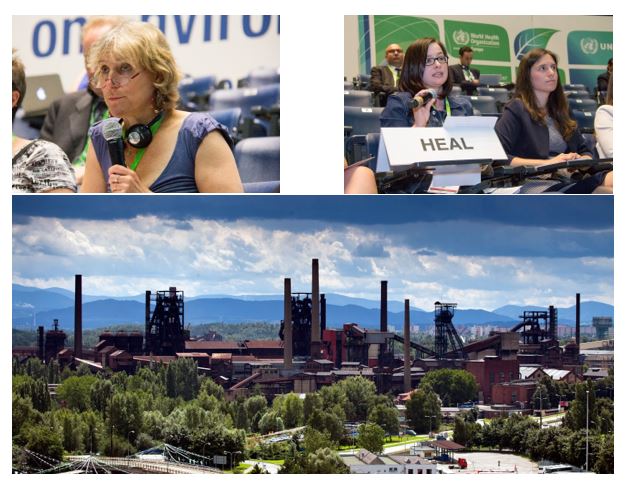European Member States have adopted a Declaration of the Sixth Ministerial Conference on Environment and Health that sets priorities and actions for implementation after 2017. EFA brought the patients perspective to the Conference as part of the HEAL delegation.
From the 13-15 June 2017 ministers from the World Health Organisation European region travelled to Ostrava in the Czech Republic to participate in the Sixth Ministerial Conference on Environment and Health organised by the World Health Organization (WHO). More than 600 ministerial representatives from 60 European countries attended the conference.
Member States adopted a Declaration of the Sixth Ministerial Conference on Environment and Health which includes an action plan for its implementation and agreement on revised institutional arrangements for the European Environment and Health Process after 2017. Although the actions are not legally binding for the Member States, the political importance of the declaration and pledges to produce national environmental health portfolios by end of 2018 should increase the urgent action needed.
EFA’s Isabel Proaño is member of the Health and Environment Alliance (HEAL) Executive Committee and attended the 6th Ministerial Conference on Environment and Health as member of the 12-representatives HEAL delegation.
Only two civil society organisations are official stakeholders of the WHO European Environment and Health Process (EHP): HEAL and the European Environment and Health Youth Coalition (EEHYC). EFA is a full HEAL member and has provided with the allergy, asthma and COPD patients perspective to HEAL during this last stage of the Environmental and Health process.
Defining Europe’s environment and health priorities in the 21st century
Almost one and a half million deaths per year in the WHO European Region are caused by environmental risks that could be avoided and/or eliminated. There is therefore urgent need to continue and strengthen efforts addressing the leading environmental determinants of ill health. EFA patients are particularly affected.
These include:
- air pollution
- inadequate water and sanitation services;
- hazardous chemicals;
- waste and contaminated sites; and
- climate change
The Ostrava Declaration identifies priority actions and targets of the 2030 Sustainable Development Agenda in the European Region as well as the Health 2020 – the WHO European policy framework for health and well-being.
Air pollution, first environmental health priority in Europe
Positively, the first priority action to implement at national level is to “protect and promote the health and well-being of all our people and to prevent premature deaths, diseases and inequalities related to environmental pollution and degradation” (9.a). More specifically, by “improving indoor and outdoor air quality for all, as one of the most important environmental risk factors in the Region, through actions to meet the values of the WHO air quality guidelines in a continuous process of improvement” (12.a).
The 6th Ministerial Conference is a follow up to the previous 2010 Declaration adopted in Parma, setting clear and specific goals for the European region to reduce health impacts from environmental policies. Among those, the Parma Declaration fixed the steps towards smokefree environments and the elimination of asbestos-related diseases. These objectives apply to the WHO European region (53 countries). The European Union, official stakeholder of the European Environment and Health Process, has not initiated specific smokefree and asbestos legislation since the Parma Declaration. It has though adopted legislation to tackle outdoor air pollution, mainly focusing on industrial and traffic emissions.
However, the goals adopted in the Ostrava declaration are weaker than in Parma. Given that many of the 60 countries of the European region have not yet adopted effective actions to tackle the WHO 2011 agreed priorities, the Ostrava Ministerial has lacked ambition. One example of this are the weak proposals to decrease indoor and outdoor air pollution. As Isabel Proaño stated in plenary, the set of actions accompanying the declaration do not envisage phasing out coal power plants, one of the main air pollutant sources in Europe, cause of high human respiratory distress.
HEAL delegation at the conference served to point out the weakness of the agreement and to call for urgent and targeted action on addressing protecting children and pregnant women from exposure to harmful chemicals, especially endocrine disruptor chemicals, and inequalities.
More information about HEAL’s role at the Ostrava conference in HEAL’s website.
